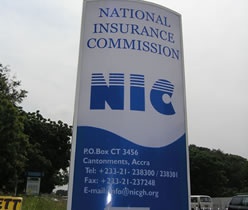New minimum capital requirements approved by the National Insurance Commission (NIC) for the insurance industry will no longer require Parliamentary approval to come into force when the new Insurance bill is passed into law.
The National Insurance Commission (NIC) is seeking to achieve flexibility in the setting of minimum capital requirements for the insurance industry through enactment of the new insurance legislation.
Presently, any new minimum capitalisation requirement set by the NIC must be approved by Parliament before it can be binding on industry players -- a provision the regulator is hoping will be rescinded with passage of the Insurance bill to replace the Insurance Act 724.
The Deputy Commissioner of the NIC, Simon Nerro Davor, explained to the B&FT that when the insurance bill is passed the NIC will no longer have to seek approval from Parliament to tell insurers the mandatory capital they have to hold in order to do insurance business.
He said the NIC is drawing up a code and regulations which will specify the minimum capital requirement for the insurance industry.
“The provision for setting the new minimum capital requirement will be taken out of the Insurance bill and included in the code, so that it will be easier for the NIC to review the minimum capital requirement when it is needed without having to go to Parliament,” he said.
The minimum capital required to operate insurance business in the country is now GH¢5million, and the NIC is hoping to increase this to GH¢10 million. This is expected to come into force in December.
It is expected that the imminent increase in the capitalisation requirement will force some insurers into mergers and acquisitions as the regulator seeks to ensure stability in the industry and strengthen the financial muscle of insurance companies to undertake large underwriting businesses.
Currently, there are 43 licenced insurance companies operating in the country -- yet Ghana’s current insurance penetration rate is estimated at 1.5% in a population of about 26 million.
A World Bank report in 2012 titled “De-Fragmenting Africa: Deepening Regional Trade Integration in Goods and Services”, mentioned that insurance companies in Ghana and other countries within the West African Monetary Zone (WAMZ) are too small and need to recapitalise to underwrite major business.
It added that in the WAMZ region, the regional financial market remains fragmented by the lack of an official cross-border payments system; by differences in the regulatory framework for financial institutions between countries in the region; and the absence of sharing credit information across borders.
It said regulations and supervisory practices for the insurance sector are far from uniform across the region, which increases the cost of operating regionally and undermines the ability of the supervisory bodies to assess the risks posed by cross-border activities of the institutions they supervise.
Business News of Monday, 2 September 2013
Source: B&FT
NIC seeks free hand to set capital rules













